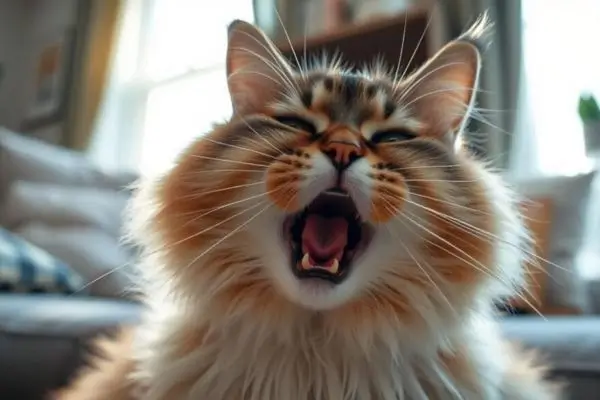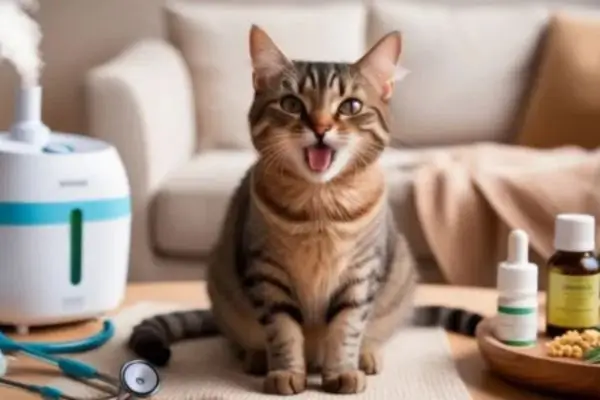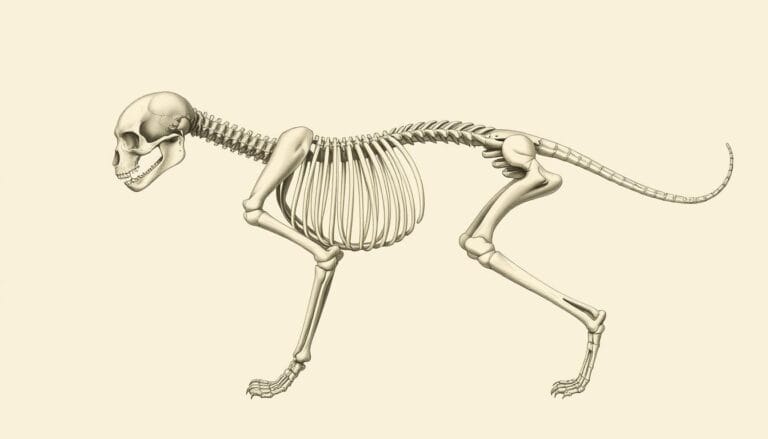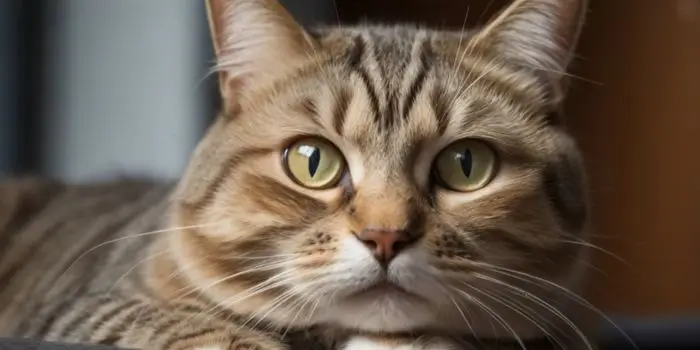Why Is Your Cat Coughing? Signs and Solutions
Coughing is a big reason for 30 million doctor visits each year for humans. But did you know feline asthma is the top reason for long coughs in cats? It’s key to know the causes and when to see a vet to keep your cat’s breathing healthy.
Cat coughing can signal many health problems. These include respiratory infections, asthma, and even heartworms. While it’s less common than in dogs, it’s still important to watch for it and get your cat the right care.
Key Takeaways
- Feline asthma is the most common cause of long-term coughing in cats.
- Respiratory infections, such as feline upper respiratory infection (URI), are a common cause of cat coughing.
- Heartworm is a less common but preventable cause of coughing in cats, especially in the United States.
- Hairballs and environmental irritants like cigarette smoke can also lead to coughing in cats.
- Prompt veterinary treatment is necessary for respiratory issues in cats to prevent complications and alleviate discomfort.
Understanding Cat Respiratory System Basics
As a pet owner, knowing about your cat’s respiratory system is key. It includes the upper and lower airways, like the nasal passages, trachea, bronchi, and lungs. Understanding these parts helps you spot health issues early and keep your cat well.
Cats breathe differently than humans and other animals. They usually take 20 to 30 breaths a minute. If your cat breathes 35 to 40 times a minute or seems to be struggling, it’s time to see the vet.
The main job of your cat’s respiratory system is to facilitate gas exchange. This lets your cat breathe in oxygen and out carbon dioxide. It also protects the lungs from harmful things in the air. Good lung function is vital for your cat’s health.
“Understanding the basics of your cat’s respiratory system can help you recognize potential issues and seek timely veterinary care.”
Spotting odd breathing in your cat can mean trouble. Knowing what normal cat breathing mechanics look like helps you spot problems. Regular vet visits are crucial for keeping an eye on your cat’s breathing and catching issues early.
Common Types of Cat Coughing
Cat coughs fall into two main types: wet and dry coughs. Knowing the differences helps find the cause and choose the right treatment.
Wet Cough Characteristics
A wet cough sounds deep and gurgly, showing fluid or mucus in the airways. It’s often seen in respiratory infections or pleural effusion. It can also hint at heart failure or lung disease.
Dry Cough Patterns
A dry cough is harsh and hollow, repeating itself. It’s usually linked to feline asthma or irritation from inhaling something foreign. It can also be caused by environmental factors like smoke or strong smells.
Chronic vs. Acute Coughing
Coughs in cats can be either chronic or acute. Chronic coughs last a long time, showing a serious health issue. Acute coughs are sudden and short, often due to a specific irritant.
Knowing the difference between wet and dry coughs, and chronic versus acute coughs, helps pet owners and vets find the cause. They can then create a good treatment plan for the cat.
| Cough Type | Characteristics | Potential Causes |
|---|---|---|
| Wet Cough | Deep, gurgling sound | Respiratory infections, pleural effusion, heart failure, lung disease |
| Dry Cough | Harsh, hollow, repetitive | Feline asthma, inhaled foreign objects, environmental irritants |
| Chronic Cough | Persistent over time | Underlying health conditions requiring medical attention |
| Acute Cough | Sudden and short-lived | Response to a specific irritant or event |
Cat Coughing: Primary Causes and Risk Factors
Figuring out why your cat coughs can be tricky. There are many reasons, from infections to allergies. Knowing the causes helps in treating your cat’s cough effectively.
Respiratory infections are a big reason for cat coughing. Viruses like feline herpesvirus and calicivirus, and bacteria like Bordetella, can harm a cat’s breathing. This leads to coughing and other bad symptoms.
Asthma and allergies also cause cat coughing. Feline asthma is triggered by things in the air. Cats can get allergies to pollen, mold, or dust, making their cough worse.
| Respiratory Issues | Potential Causes |
|---|---|
| Viral Infections | Feline herpesvirus, Calicivirus |
| Bacterial Infections | Bordetella |
| Asthma and Allergies | Environmental irritants, Pollen, Dust |
| Foreign Objects | Swallowed toys, Feathers, Grass |
| Heart Disease | Hypertrophic cardiomyopathy |
| Lung Parasites | Lungworms |
| Hairballs | Excessive grooming, Digestive issues |
Other reasons for cat coughing include swallowed objects like toys or grass. Heart disease, especially hypertrophic cardiomyopathy, can also cause coughing. Lung parasites, like lungworms, can infect a cat’s lungs and cause coughing, along with weight loss and tiredness.
Hairballs can also make cats cough. Too much grooming or digestive problems can lead to hairballs. These can irritate a cat’s throat and cause coughing.
The way a cat coughs can tell you a lot about what’s wrong. A mild cough might just be a minor irritation. But a bad cough that doesn’t go away means your cat needs a vet fast.
Some cats are more likely to get sick and cough. Indoor cats might get asthma or allergies more often. Outdoor cats can catch infections or parasites. Age, breed, and health can also play a part.
If your cat keeps coughing or seems really sick, see a vet. Early treatment is key to keeping your cat healthy and happy.
Respiratory Infections in Felines
Respiratory infections in cats can be caused by viruses, bacteria, and fungi. These infections can range from mild sniffles to severe breathing problems. It’s important to know the different types to treat and prevent them.
Viral Infections
Viral respiratory infections are common in cats. Feline herpesvirus type 1 (FHV-1) is the main cause, affecting up to 97% of cats. About 80% of infected cats carry the virus forever, and 45% shed it sometimes. Feline calicivirus is also common, especially in shelters and breeding places.
Bacterial Infections
Bacterial infections can also affect cats’ breathing. Bordetella bronchiseptica causes a condition like “kennel cough” in cats. Chlamydia felis can cause eye infections in cats.
Fungal Infections
Fungal infections are less common but can still harm cats. Cryptococcus neoformans is a common fungus that can cause breathing problems, sneezing, and nasal discharge.
Getting a proper diagnosis and treatment is key for cats with respiratory infections. Veterinary care, including tests and medicines, is vital for managing cat respiratory infections, feline viral infections, and bacterial infections in cats.

| Infection Type | Common Pathogens | Key Symptoms | Diagnostic Tests |
|---|---|---|---|
| Viral | Feline herpesvirus type 1 (FHV-1), Feline calicivirus (FCV) | Sneezing, nasal discharge, conjunctivitis | PCR testing, virus isolation |
| Bacterial | Bordetella bronchiseptica, Chlamydia felis | Coughing, nasal discharge, conjunctivitis | Culture, PCR testing |
| Fungal | Cryptococcus neoformans | Chronic nasal discharge, sneezing, difficulty breathing | Cytological examination, imaging (X-ray, CT, MRI) |
Vaccinating cats against common respiratory pathogens is important. It helps prevent and manage cat respiratory infections. Keeping environments clean and managing cat populations is also key, especially in crowded places like shelters.
Asthma and Allergic Reactions in Cats
Feline asthma is a chronic respiratory condition that affects about 1-5% of cats. It causes airway constriction, leading to coughing, wheezing, and breathing trouble. Cats can also have allergic reactions that cause similar breathing problems.
Asthma attacks in cats can be caused by many environmental allergens. These include dust mites, pollen, mold, and cigarette smoke. Indoor cats are more likely to get asthma because of these allergens. Some research suggests Siamese cats might be more likely to get asthma.
During an asthma attack, a cat’s breathing gets faster, with over 40 breaths per minute. They may cough, wheeze, and breathe hard. Allergic reactions can also cause these symptoms.
Getting a proper diagnosis and treatment is key for cats with asthma or allergies. Vets use medical history, physical exams, and tests like X-rays and blood work to diagnose. Treatment includes medications and changes to the cat’s environment to avoid allergens.
While cat asthma can’t be cured, with the right care, cats can live well. Keeping them healthy, feeding them well, and avoiding allergens helps manage symptoms and prevent attacks.
“Feline asthma is a relatively common respiratory condition that can significantly impact a cat’s quality of life, but with the right treatment and management, cats can thrive.”
It’s important to recognize feline allergies and feline bronchitis symptoms early. Quick vet care can prevent serious problems. Working with a vet, cat owners can manage their pet’s respiratory health and keep them comfortable.
Foreign Objects and Environmental Irritants
Cats face many environmental challenges that can cause coughing. From small objects to seasonal allergens, knowing the causes and how to prevent them is key. This helps keep your cat’s breathing healthy.
Common Household Triggers
Cats are curious and might breathe in small things like seeds or toy pieces. These can get stuck in their airways, making them cough. Also, dust, cleaning products, and smoke can irritate their sensitive lungs.
Seasonal Factors
Cats can get seasonal allergies just like people do. Pollen, mold, and other airborne irritants can make them cough. When pollen or mold levels go up, it can make your cat uncomfortable.
Prevention Methods
- Keep your home clean and dust-free by vacuuming, dusting, and using air purifiers.
- Choose pet-safe cleaners to avoid irritating your cat’s lungs.
- Watch your cat’s grooming to prevent hairballs that can cause coughing.
- If your cat has allergies, talk to your vet about how to manage them.
By knowing what can trigger coughing and making your home safe, you can help your cat avoid cat environmental irritants and feline allergic triggers. This can help prevent cat coughing.
When to Seek Veterinary Care
As a responsible cat owner, it’s crucial to watch your cat’s respiratory health closely. While a cough now and then might not be a big deal, there are times when you should see a vet. This is especially true for veterinary care for your cat’s cough.
If your cat’s cough lasts more than a few days or gets worse, it’s time to visit the vet. Chronic or frequent coughing can mean there’s a bigger health issue. This could be something like respiratory infections, allergies, or even feline asthma. It’s important to act early to avoid bigger problems and keep your cat healthy.
Also, if your cat’s cough is severe and they’re having trouble breathing, seem really tired, or aren’t eating, get emergency care. Severe coughing that makes their gums look blue or if they collapse is a sign of a serious problem. These are signs that need immediate vet attention because they could be life-threatening.
Cats with past health issues need extra watchfulness for cough changes. Even if the cough doesn’t seem bad, it’s safer to have your vet check it out. This is because cat cough treatment might be needed to fix the real problem.
Remember, your cat’s health and happiness are what matter most. By watching closely and getting when to see vet for cat cough help when needed, you can make sure your cat stays healthy and happy.

“Paying attention to your cat’s coughing and seeking veterinary care when needed can make all the difference in their overall health and quality of life.”
Diagnostic Procedures and Tests
Diagnosing cat coughing is a detailed process. Your vet will listen to your cat’s heart and lungs. They also check for nasal discharge or fever.
Advanced Diagnostic Methods
If the first check doesn’t show what’s wrong, your vet might suggest more tests. These could be X-rays, bronchoscopy, or CT scans. These help see inside your cat’s lungs and find problems like inflammation or foreign objects.
Laboratory Testing Options
- Blood work to check overall health and find infections or other issues
- Fecal tests to look for parasites that might be causing the cough
- Tracheal washes to find out what’s causing the infection
These tests help your vet figure out why your cat is coughing. They then create a treatment plan. Working with your vet ensures your cat gets the best care for their cough.
“Diagnosing the cause of a cat’s cough is crucial to providing effective treatment and managing their respiratory health effectively.”
Treatment Options and Management Strategies
If your cat is coughing, the treatment depends on the cause. For bacterial infections, antibiotics are often prescribed. Antiviral meds help with viral respiratory illnesses in cats.
Corticosteroids and bronchodilators are used for asthma and allergies. These help reduce inflammation and open airways. If a foreign object is inhaled, your vet might remove it under sedation. Heart disease or cancer may need long-term management plans.
Using humidifiers or nebulizers can help with cough symptoms. Regular vet visits and monitoring are key. This ensures the treatment plan works and makes any needed changes.







